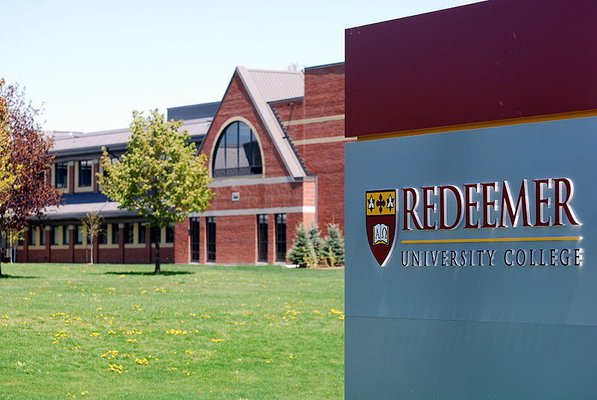Blog Post
The CBC targets Redeemer University for Christian standards on sexuality
By Jonathon Van Maren
The CBC has found its next target in the progressive war against conservative Christian institutions: Redeemer University, based in Hamilton, Ontario. It is a private university rooted in the Reformed Christian tradition, and like most such institutions, has a code of conduct based on Scripture. This is not news. In fact, it is the opposite of news. “Christian university adheres to Christian code of conduct” is not exactly “breaking.” Historically speaking, the real news story here is the phenomenal ignorance of those who find this to be shocking or unusual.
It also goes without saying that nobody has to attend Redeemer University if they are uncomfortable with its Christian values. My sister and several friends attended (and attend) Redeemer; I’ve given speeches there several times. It bears mentioning that until recently, tuition was extremely expensive. Redeemer is private and therefore receives no government funding. The assumption was that if you are willing to pay the high fees, you are doing so because you want to opt in to Redeemer’s milieu.
On the other hand, if you identify as LGBTQ, nearly every campus in the country has half a dozen booming LGBTQ clubs—you can take your pick. You’ll even have your own month with nonstop Pride celebrations. I went to Simon Fraser University, and such events were relentless and year-round. But applying to a private Christian university, agreeing to their biblical code of conduct, and then expressing your shock and horror to a CBC reporter about the fact that you took all of those very intentional steps is ridiculous and dishonest.
Of course, the progressives over at the airtight CBC see it differently. Citing “queer students” who attended Redeemer and reported feeling uncomfortable, the CBC suggests that Redeemer needs to be dealt with through lawsuits or human rights complaints. Trinity Western University was forced to change its policies, the CBC notes, and cites human rights experts that believe somebody—anybody? Anybody?—might have a good chance at success if they sued Redeemer over its intolerance. The entire column was written for the express purpose of goading somebody into doing so. Redeemer does not have the same financial resources as TWU, so they could be an easier target.
Redeemer’s president was wise enough to refuse requests for an interview and to instead respond to the CBC by email:
“All people, including LGBTQ people, are created in the image of God and therefore deserve to be treated with dignity, love and respect. Redeemer condemns violence, harassment and intimidation,” [President Robert Graham] wrote. “As an institution based in the Reformed Christian tradition, we believe that all people are sinful and that this affects everyone’s sexuality and relationships. The tradition also includes the understanding that Christian marriage is between a man and a woman and that sexual intimacy is reserved for a marital relationship.”
He said that the Ontario Human Rights Code, specifically, sections 18 and 24, protects Redeemer’s right to operate in accordance with its religious beliefs. “What some refer to as discrimination is, in fact, freedom of association, which is protected by the law and is a core Canadian value,” Graham said.
Over at the Association for Reformed Political Action (ARPA), lawyer John Sikkema has a great analysis of what he refers to as “the CBC’s strategic attack on Redeemer University”:
Enter the mysterious “human rights experts.” “Human rights experts told CBC they see Redeemer’s policy as discriminatory and that it could be challenged in court.” And, “In Redeemer’s case, human rights experts say the policy could lead to lawsuits.” And, noting that although Redeemer is privately funded, it sometimes receives research and other public grants, “Human rights experts say the government giving money to a school found to discriminate would contravene the Canadian Human Rights Act and potentially the Charter of Rights and Freedoms.”
Who are these experts? CBC doesn’t say, and it’s really beside the point. Citing unnamed experts gives CBC cover to get its own implicit message across – namely, that it’s time to wage legal warfare against Redeemer and the like.
You could be forgiven for thinking there is a general consensus among lawyers that Redeemer’s policy breaches the Human Rights Code after reading this piece. Yet no tribunal has ever found that Redeemer’s policy, or similar policies at other institutions, violate human rights law. Nor has any court ever found that extending public benefits or funding to religious schools is illegal. For all CBC’s unnamed “experts,” the article cites only one lawyer, Susan Ursel, and one paralegal, Christopher Karas. Ursel, a longtime advocate of the LGBTQ cause, represented the Canadian Bar Association as an intervener in the Trinity Western case and told the Supreme Court that it was time to review the charitable status of organizations with policies like TWU’s. Karas took his Catholic high school to court for preventing him from advertising his “Gender and Sexuality Alliance” group with posters and is now taking Canada Blood Services to court for its policy towards blood donations from MSM (men-who-have-sex-with-men).
Karas and Ursel make curious arguments about the Redeemer policy’s (il)legality. Karas makes the blatantly false claim, which CBC should have been embarrassed to print, that “courts have generally held that religious rights are institutional rights whereas sexual orientation and gender are individual rights, which supersede religious rights.” In fact, our courts have never held that religious institutions have constitutional rights (the people within them do), though they acknowledge that religious freedom has important communal dimensions. And as for Karas’ statement that courts hold “sexual orientation and gender rights” above “religious rights,” our courts have stated repeatedly, almost as a mantra, that there is “no hierarchy of rights.” (This no-hierarchy principle remains in effect, at least on paper, though we may question the extent to which our courts follow this principle in practice.)
Neither Karas or Ursel explain the law as it is, despite CBC presenting them as experts to help its readers understand the legal situation. Rather, Karas and Ursel present the law as they (and the CBC) think it should be. That is why CBC went to them. That is why CBC didn’t ask constitutional law professors, for example, whether Redeemer’s policy is legal, or bother to ask for comment from civil liberties lawyers on the other side of the issue.
What if somebody sues Redeemer and loses? Couldn’t that hurt CBC’s credibility (with those for whom it still has any)? In CBC’s worldview, even if Redeemer successfully defends itself against a discrimination suit today, it must eventually lose. The more that people think “discrimination” at such institutions should be disallowed, the more likely it is that all branches of government will work to change matters. Laws can be amended by legislatures or reinterpreted by courts. Research grants can be denied. Accreditation can be withdrawn and charitable status revoked.
The TWU decision was about whether a law society could refuse to recognize would-be graduates from TWU’s proposed law school. It was not (directly) about whether the provincial government could refuse to accredit its law school, or whether TWU violated the Human Rights Code, or whether TWU can receive public research grants or keep its charitable status.
But CBC “journalists” see an opportunity to extend the progressive victory in the TWU case. They’re playing the long game incrementally, by identifying their next objectives and targets – which are closer to home than you might think.
Sikkema is precisely right (and his previous piece on the media targeting a Christian wedding videographer is worth the read, as well.) Progressive media outlets—in this case the state broadcaster, funded by our own tax dollars—are using faux journalism as trial balloons for their own agenda. This project involves the systematic targeting of Christian institutions for the purpose of forcing them to knuckle under or shut down entirely. The CBC and its allies will not be happy until the country is as homogenous as they are.









Just an FYI, Redeemer had a massive tuition slash last year. Their rates are no longer “extremely expensive” but right on par with public universities.
Thanks for this update!